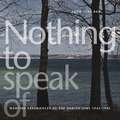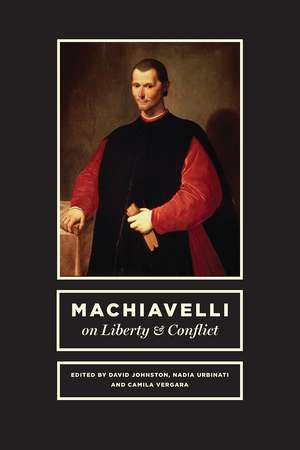Machiavelli on Liberty and Conflict: Emersion: Emergent Village resources for communities of faith
Editat de David Johnston, Nadia Urbinati, Camila Vergaraen Limba Engleză Hardback – 20 apr 2017
More than five hundred years after Machiavelli wrote The Prince, his landmark treatise on the pragmatic application of power remains a pivot point for debates on political thought. While scholars continue to investigate interpretations of The Prince in different contexts throughout history, from the Renaissance to the Risorgimento and Italian unification, other fruitful lines of research explore how Machiavelli’s ideas about power and leadership can further our understanding of contemporary political circumstances.
With Machiavelli on Liberty and Conflict, David Johnston, Nadia Urbinati, and Camila Vergara have brought together the most recent research on The Prince, with contributions from many of the leading scholars of Machiavelli, including Quentin Skinner, Harvey Mansfield, Erica Benner, John McCormick, and Giovanni Giorgini. Organized into four sections, the book focuses first on Machiavelli’s place in the history of political thought: Is he the last of the ancients or the creator of a new, distinctly modern conception of politics? And what might the answer to this question reveal about the impact of these disparate traditions on the founding of modern political philosophy? The second section contrasts current understandings of Machiavelli’s view of virtues in The Prince. The relationship between political leaders, popular power, and liberty is another perennial problem in studies of Machiavelli, and the third section develops several claims about that relationship. Finally, the fourth section explores the legacy of Machiavelli within the republican tradition of political thought and his relevance to enduring political issues.
With Machiavelli on Liberty and Conflict, David Johnston, Nadia Urbinati, and Camila Vergara have brought together the most recent research on The Prince, with contributions from many of the leading scholars of Machiavelli, including Quentin Skinner, Harvey Mansfield, Erica Benner, John McCormick, and Giovanni Giorgini. Organized into four sections, the book focuses first on Machiavelli’s place in the history of political thought: Is he the last of the ancients or the creator of a new, distinctly modern conception of politics? And what might the answer to this question reveal about the impact of these disparate traditions on the founding of modern political philosophy? The second section contrasts current understandings of Machiavelli’s view of virtues in The Prince. The relationship between political leaders, popular power, and liberty is another perennial problem in studies of Machiavelli, and the third section develops several claims about that relationship. Finally, the fourth section explores the legacy of Machiavelli within the republican tradition of political thought and his relevance to enduring political issues.
Din seria Emersion: Emergent Village resources for communities of faith
-
 Preț: 144.99 lei
Preț: 144.99 lei -
 Preț: 133.99 lei
Preț: 133.99 lei - 9%
 Preț: 352.50 lei
Preț: 352.50 lei -
 Preț: 146.50 lei
Preț: 146.50 lei - 18%
 Preț: 348.59 lei
Preț: 348.59 lei -
 Preț: 273.93 lei
Preț: 273.93 lei -
 Preț: 161.27 lei
Preț: 161.27 lei -
 Preț: 548.71 lei
Preț: 548.71 lei - 8%
 Preț: 360.28 lei
Preț: 360.28 lei -
 Preț: 208.31 lei
Preț: 208.31 lei -
 Preț: 215.51 lei
Preț: 215.51 lei -
 Preț: 302.76 lei
Preț: 302.76 lei - 8%
 Preț: 563.24 lei
Preț: 563.24 lei -
 Preț: 156.84 lei
Preț: 156.84 lei -
 Preț: 279.55 lei
Preț: 279.55 lei -
 Preț: 106.35 lei
Preț: 106.35 lei -
 Preț: 183.89 lei
Preț: 183.89 lei -
 Preț: 138.81 lei
Preț: 138.81 lei - 9%
 Preț: 352.77 lei
Preț: 352.77 lei - 8%
 Preț: 346.31 lei
Preț: 346.31 lei - 6%
 Preț: 324.95 lei
Preț: 324.95 lei -
 Preț: 176.49 lei
Preț: 176.49 lei - 9%
 Preț: 353.24 lei
Preț: 353.24 lei -
 Preț: 101.43 lei
Preț: 101.43 lei -
 Preț: 144.80 lei
Preț: 144.80 lei -
 Preț: 216.89 lei
Preț: 216.89 lei -
 Preț: 163.52 lei
Preț: 163.52 lei -
 Preț: 128.69 lei
Preț: 128.69 lei -
 Preț: 182.98 lei
Preț: 182.98 lei -
 Preț: 67.35 lei
Preț: 67.35 lei -
 Preț: 185.37 lei
Preț: 185.37 lei - 18%
 Preț: 2261.34 lei
Preț: 2261.34 lei -
 Preț: 115.82 lei
Preț: 115.82 lei -
 Preț: 138.26 lei
Preț: 138.26 lei -
 Preț: 179.04 lei
Preț: 179.04 lei -
 Preț: 167.85 lei
Preț: 167.85 lei -
 Preț: 115.53 lei
Preț: 115.53 lei -
 Preț: 160.63 lei
Preț: 160.63 lei -
 Preț: 307.53 lei
Preț: 307.53 lei - 12%
 Preț: 290.56 lei
Preț: 290.56 lei - 8%
 Preț: 311.68 lei
Preț: 311.68 lei - 18%
 Preț: 502.35 lei
Preț: 502.35 lei -
 Preț: 229.92 lei
Preț: 229.92 lei -
 Preț: 127.89 lei
Preț: 127.89 lei -
 Preț: 120.81 lei
Preț: 120.81 lei -
 Preț: 208.54 lei
Preț: 208.54 lei -
 Preț: 94.22 lei
Preț: 94.22 lei -
 Preț: 126.25 lei
Preț: 126.25 lei -
 Preț: 92.35 lei
Preț: 92.35 lei - 8%
 Preț: 564.99 lei
Preț: 564.99 lei
Preț: 303.39 lei
Preț vechi: 369.54 lei
-18% Nou
Puncte Express: 455
Preț estimativ în valută:
58.05€ • 60.77$ • 48.32£
58.05€ • 60.77$ • 48.32£
Carte indisponibilă temporar
Doresc să fiu notificat când acest titlu va fi disponibil:
Se trimite...
Preluare comenzi: 021 569.72.76
Specificații
ISBN-13: 9780226429304
ISBN-10: 022642930X
Pagini: 440
Dimensiuni: 152 x 229 x 30 mm
Greutate: 0.75 kg
Ediția:1
Editura: University of Chicago Press
Colecția University of Chicago Press
Seria Emersion: Emergent Village resources for communities of faith
ISBN-10: 022642930X
Pagini: 440
Dimensiuni: 152 x 229 x 30 mm
Greutate: 0.75 kg
Ediția:1
Editura: University of Chicago Press
Colecția University of Chicago Press
Seria Emersion: Emergent Village resources for communities of faith
Notă biografică
David Johnston teaches political philosophy at Columbia University. He is the author, most recently, of A Brief History of Justice. Nadia Urbinati is the Kyriakos Tsakopoulos Professor of Political Theory at Columbia University and the author of several books, including, most recently, The Tyranny of the Moderns.Camila Vergara is a PhD candidate in political science at Columbia University.
Cuprins
Introduction
1. Machiavelli on Necessity
5. Machiavelli and the Misunderstanding of Princely Virtù
9. Machiavelli and the Gracchi: Republican Liberty and Class Conflict
12. The Reception of Machiavelli in Contemporary Republicanism: Some Ambiguities and Paradoxes
Index
David C. Johnston, Nadia Urbinati, and Camila Vergara
Part One: Between Antiquity and Modernity1. Machiavelli on Necessity
Harvey C. Mansfield
2. Machiavelli on Good and Evil: The Problem of Dirty Hands RevisitedGiovanni Giorgini
3. Machiavelli and the Critics of Rome: Rereading Discourses I.4Gabriele Pedullà
4. Machiavelli, “Ancient Theology,” and the Problem of Civil ReligionMiguel Vatter
Part Two: The Prince and the Politics of Necessity5. Machiavelli and the Misunderstanding of Princely Virtù
Quentin Skinner
6. The Necessity to Be Not-Good: Machiavelli’s Two RealismsErica Benner
7. Loyalty in AdversityStephen Holmes
8. Machiavelli and the Modern Tyrant Paul A. Rahe
Part Three: Class Struggle, Financial Power, and Extraordinary Authority in the Republic9. Machiavelli and the Gracchi: Republican Liberty and Class Conflict
Benedetto Fontana
10. Machiavelli, the Republic, and the Financial CrisisJérémie Barthas
11. Extraordinary Accidents in the Life of Republics: Machiavelli and Dictatorial AuthorityMarco Geuna
Part Four: Machiavellian Politics beyond Machiavelli12. The Reception of Machiavelli in Contemporary Republicanism: Some Ambiguities and Paradoxes
Jean-Fabien Spitz
13. On the Myth of the Conservative Turn in Machiavelli’s Florentine HistoriesJohn P. McCormick
14. Political Imagination, Conflict, and Democracy: Machiavelli’s Republican RealismLuca Baccelli
15. “Armi proprie e improprie” in the Work of Some Representative Italian Readers of the Twentieth CenturyMichele Battini
16. What Does a “Conjuncture-Embedded” Reflection Mean? The Legacy of Althusser’s Machiavelli to Contemporary Political TheoryMarie Gaille
ContributorsIndex
Recenzii
“Machiavelli on Liberty and Conflict offers readers a series of invaluable essays that represent the most important trends in contemporary scholarship on Machiavelli. Johnston, Urbinati, and Vergara have assembled a remarkable group of scholars, including several whose recent contributions are not widely available in English, and the diverse essays in the book carry on a highly engaging conversation with one another with a coherence that one seldom sees in an anthology. The editor’s introduction is well-written and exhaustive, offering a clear picture of the reception of Machiavelli’s writing from the time of its original publication to the recent ‘renaissance’ of Machiavelli scholarship.”
“The contributors to Machiavelli on Liberty and Conflict bring a diversity of approaches to bear on the works of Machiavelli. Among them are Harvey Mansfield, who has written an elegant analysis of the idea of necessity; Miguel Vatter, who develops the similarities between Machiavelli and al-Farabi vis-à-vis The Art of War; Quentin Skinner, who offers a fine-grained analysis of the crucial concept of virtue; and Gabriele Pedullà, who gives a highly textured account of the possible foils Machiavelli alludes to in the Discourses on Livy, and many others that will set the volume apart from many other such collections. Machiavelli on Liberty and Conflict will be welcomed by classicists and scholars in Renaissance studies, as well as political theorists.”
"The volume presents a wide range of approaches and interpretations . . . Machiavelli on Liberty and Conflict performs the sort of disagreement that Berlin catalogued, a performance that is particularly apt given the centrality of conflict to the volume’s title."
